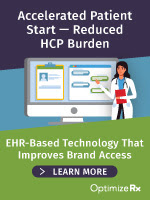Karina discusses the challenges health care providers and patients face in their quest to secure prior authorizations from payers. She argues that manufacturers adopt an electronic health record-based solution to facilitate access to therapies, from the point of prescription through the point of dispensing at the pharmacy.
To test the efficacy of your market access digital strategy against industry best practices, take the OptimizeRx Market Access Strategy Quiz.
Read on for Karina’s insights.
Three Technology Tactics for Overcoming Prior Authorization Hurdles
By Karina Castagna, SVP Access & Adherence, OptimizeRx
In a world where payers have a significant impact on whether a patient starts on their doctor-preferred therapy, pharmaceutical leaders should consider leveraging digital technologies to execute in a disadvantaged access position more effectively. Here’s your guide to the challenges health care providers (HCPs) and patients face due to access restrictions, and how to facilitate brand access with a digital strategy that emphasizes awareness and communication from the point of prescribing in electronic health records (EHR) through the point of dispensing at the pharmacy.
BRAND AND ACCESS LEADERS ARE IMPACTED BY PAYER RESTRICTIONS
Payers are increasingly using tools such as prior authorizations (PAs), formulary tiering, and step therapy to control access through utilization management (UM). Avalere Health’s Utilization Management Trends in the Commercial Market, 2014-2020 reports that UM prevalence increased across 12 therapeutic areas. Within these, prior authorizations were most common in multiple myeloma, chronic myeloid leukemia, and autoimmune disorders. Step-therapy was most common in rheumatoid arthritis and psoriasis.
A recent Deloitte article emphasized how payers are increasingly focused on high volume disease areas that impact much of the U.S. population, such as metabolic, cardiovascular, gastrointestinal, and central nervous system disease states. Additionally, Deloitte studied 18 immunology drugs and determined that the plan use of prior authorization criteria and language influenced drug prescribing and revenue—effectively taking the decision away from the doctor.
PAs AND OTHER UM HAVE A NEGATIVE IMPACT ON PATIENT CARE AND CLINICAL OUTCOMES
Physicians are trained to make clinical decisions for their patients, yet the 2021 AMA PA Physician Survey reports that 73% of the time PAs are sometimes, rarely or never based on evidence-based medicine or clinical guidelines. While this high level of UM control is driven by payer budgets, it ignores the other costs to our healthcare system, including the negative impact on patient care, burden on healthcare providers, and cost to employers.
In the AMA survey, doctors also reported that 91% of the time PAs lead to a negative clinical outcome. Specifically, 93% of doctors reported care delays for patients whose treatment plan requires a prior authorization, and 82% of doctors shared that prior authorization requirements can lead to patients deciding not to start the preferred treatment. Even worse, 34% of doctors reported that a prior authorization led to a serious adverse event such as hospitalization, a permanent disability, or even death.
PAs AND OTHER UM CREATE ADMINISTRATIVE HURDLES THAT MAY KEEP PATIENTS FROM THERAPY
In a recent physician survey conducted by OptimizeRx, 69% of physicians ranked the process of starting patients on a specialty medication as very or extremely difficult. Physicians and their staff reported spending an average of 20 hours per week helping patients gain access to specialty medications, with an estimated cost to their practices of $5,800 per month. Ultimately, it is patients who lose: 53% of physicians reported changing their treatment plan for 25% or more of their patients due to access challenges, and 66% of physicians shared that they would prescribe something different in 25% or more of their patients if access was not a factor.
SO, WHAT CAN HELP? TO EXECUTE IN A DISADVANTAGED ACCESS POSITION MORE EFFECTIVELY, CONSIDER DIGITAL STRATEGIES THAT ADDRESS BRAND HURDLES
Improved brand access can be created through a digitally-focused strategy that emphasizes brand awareness and ease of prescribing in the EHR. Yet many market access teams are not capitalizing on the range of EHR-based technology available to support prescribing and access processes.
For brands committed to improving patient access, there are three key pillars for a successful digital strategy:
- Increasing awareness while HCPs deliver care: Communicate key information about formulary coverage, patient benefits, and approval processes directly in the EHR to avoid the confusion and uncertainty that leads to alternative therapy selection or initiation delays.
- Augmenting face-to-face field team/HCP visits: Allow providers to easily contact their MSL or sales rep directly from the EHR, while taking advantage of advances in artificial intelligence/real-world data to deliver highly personalized communications about access support, affordability programs or other resources that reflect individual HCP patient panels.
- Streamlining processes between key stakeholders: Reduce the friction of hub enrollment, prior authorization and/or limited distribution networks through EHR-based tools that eliminate repetitive administrative steps, increase submission accuracy, and allow greater stakeholder transparency.
Curious to test the maturity of your market access digital strategy? Take the OptimizeRx Market Access Strategy Quiz to benchmark your brand against industry best practice and get practical tips to advance your approach.
Sponsored guest posts are bylined articles that are screened by Drug Channels to ensure a topical relevance to our exclusive audience. These posts do not necessarily reflect our opinions and should not be considered endorsements. To find out how you can publish a guest post on Drug Channels, please contact Paula Fein (paula@DrugChannels.net).



No comments:
Post a Comment